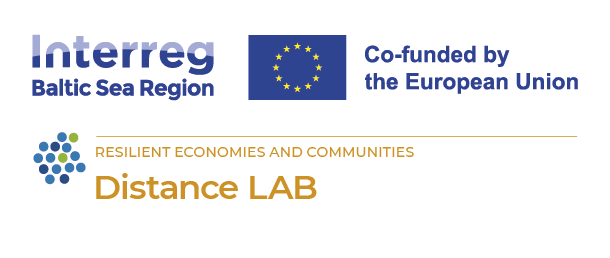
Promoting Innovation and Business Services in The Framework of Living Labs in the Distance LAB Project
How Living Labs are being practically implemented to support innovation and business services across the Baltic Sea Region
This conference paper presents key insights from a study developed by Zane Zeibote and Dāvis Vītols from the University of Latvia, partners of the Distance LAB project. The research explores how Living Labs are being practically implemented to support innovation and business services across the Baltic Sea Region, highlighting their role in fostering collaboration, co-creation, and territorial development.
Summary of the paper
Living Labs have become increasingly popular as collaborative innovation structures. They are well suited for implementing open innovation – a key concept in innovation management and can be achieved through collaboration with stakeholders, knowledge sharing, and co-creation. The available research work explores different aspects of Living Labs, but there is not much evidence in the literature about their practical implementation activities and outcomes.
Therefore, this paper explores the experience obtained in the framework of the Distance LAB project, where Living Labs are being developed according to the hub’s action model to ensure cooperation and co-creation activities in the Baltic Sea Region with an objective to unite local Living Labs into the International multidisciplinary living lab network (IMLLN) and by service sets combined into service production models, and made available on the hub’s platform.
In the case of the Distance LAB project the local Living Labs serve as user-centered ecosystems for testing and validating user-oriented services and solutions in real-life conditions. This study investigates the activities deployed within seven Living Labs developed by project partners to support innovation processes, as well as the provision of business services for the Baltic Sea Region companies. It is based on the literature research, live evidence observed during the implementation of Distance LAB project and results of surveys of experts – representatives of organization currently developing Living Labs in five Baltic Sea Region countries. Therefore, it examines the Living Lab in a territorial context aiming to provide insights into the mechanisms and processes that foster synergies among Living Lab actors and territorial quadruple helix stakeholders.
The role of the Living Lab as an ecosystem facilitator is also examined. The research findings emphasize the importance of collaboration, co-creation and design thinking approach to maximize the impact of Living Lab initiatives on territorial ecosystems. This study provides insights useful for Living Lab managers and policymakers on key activities and approaches that promote collaboration and support requirements of stakeholders.




